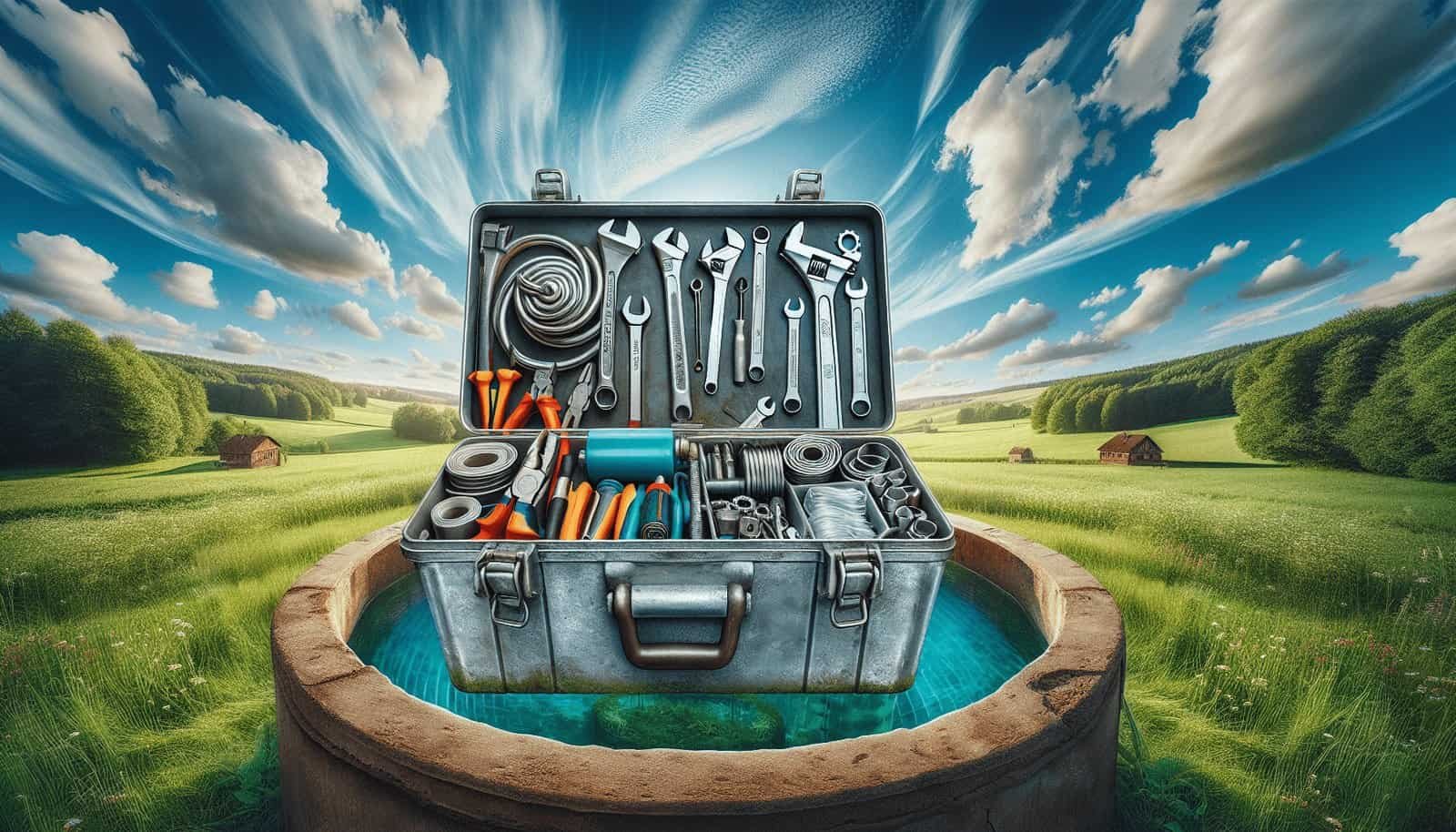Have you ever wondered about the essential tools you need for maintaining a water well? Owning and maintaining a water well is a significant responsibility that comes with the vital task of keeping your water supply clean and reliable. This article is designed to guide you through the essential tools necessary for water well maintenance, ensuring your well is safe, efficient, and long-lasting. With a friendly and straightforward approach, let’s break down these tools and their importance in maintaining your water well.

Understanding Water Well Maintenance
Maintaining a water well isn’t just about keeping it working; it’s about ensuring the water you consume is of the highest quality. Regular maintenance helps avoid potential problems that could lead to costly repairs or health risks. Understanding what tools are necessary can empower you to address issues promptly and effectively.
Why Is Water Well Maintenance Important?
Water wells can develop a variety of issues over time, from bacterial contamination to mechanical failures. Regular maintenance ensures that everything is functioning correctly, preventing bacterial growth, sediment build-up, and equipment malfunction. Moreover, routine checks extend the lifespan of your well machinery, making your investment more cost-effective in the long run.
Basic Components of a Water Well
Before jumping into the tools needed, it’s helpful to have a basic understanding of your well’s components. Typically, a water well consists of a well casing, a well cap, a pump, and sometimes a pitless adapter. All these components play a crucial role in the well’s operation, and problems with any of them could require specific tools for inspection and repair.
Essential Tools for Water Well Maintenance
Having the right tools ensures you can perform regular inspections and minor repairs efficiently. Here’s a breakdown of some of the most important tools you might need:
Inspection Tools
Regular well inspections help spot potential issues before they develop into significant problems. Here are a few tools that can aid in these inspections:
Flashlight or Headlamp: Adequate lighting is crucial when inspecting your well. A powerful flashlight or headlamp can help you spot issues deep inside the well or around dark areas.
Camera: A waterproof or well inspection camera can be useful for taking a closer look at hard-to-reach places within your well. It can help spot cracks or leaks in the casing that aren’t visible to the naked eye.
Cleaning Tools
Sometimes, your well components need a bit of scrubbing to keep them free of deposits and contaminants. Here are some cleaning tools you might need:
Bleach: This household item is often used for disinfecting wells and killing bacteria. Ensure you use it in appropriate amounts to prevent any harm to your water supply.
Brushes: Long-handled brushes can be handy for scrubbing away deposits that accumulate on parts of your well.
Safety Equipment
Ensuring your safety while performing maintenance is crucial. Here are some items to consider:
Gloves: Protect your hands, especially when using cleaning chemicals or handling sharp equipment.
Protective Eyewear: This is essential when dealing with caustic cleaning solutions or when working in environments where debris is present.
Mask or Respirator: Good air quality is important while working in confined spaces, especially to prevent inhalation of any harmful chemicals or particulates.
Mechanical Tools
For mechanical adjustments or repairs, you’ll need some specific tools:
Adjustable Wrench: Useful for tightening or loosening nuts and bolts on well pumps and other mechanical parts.
Screwdriver Set: Different heads may be required to adjust various components, so a complete set ensures you’re prepared.
Pliers: Good for gripping, twisting, and pulling out small or awkward parts that a wrench can’t handle.
Specialized Tools for Advanced Maintenance
For more complicated issues, there are specialized tools that may be required. Here’s a look at these advanced tools:
Pump Removal Tools
Over time, you may need to remove and inspect the pump. For this, you’ll need:
- Pump Hoist: A hoist can be used to lift the pump out of the well safely. This tool is necessary if your pump requires servicing or replacement.
Well Chlorination Equipment
Preventing bacteria from growing in your well is critical. For effective chlorination, these tools may be necessary:
Chlorination Kit: These kits often include everything you need to disinfect your well, from chlorine tablets to measuring devices.
Measuring Cup: Accurate measurements of chemicals ensure effective and safe treatment.
Flow Meter
Monitoring the flow rate of your well water is vital to maintaining efficiency and detecting potential issues.
- Flow Meter: This device helps measure the amount of water being pumped over a set period, which can indicate if the system is underperforming.
Video Inspection Equipment
For in-depth inspections, sometimes a basic camera isn’t enough.
- Downhole Camera: This camera is specifically designed for wells and can provide a real-time feed to check for issues deep within the well.
Regular Maintenance Activities
Understanding which tools you need is just part of the process; knowing how to use them and which maintenance tasks to prioritize is equally important.
Inspecting the Well Cap
The well cap acts as a barrier against debris and contaminants. Regular inspections can help ensure it’s intact and functioning correctly.
- Use a flashlight to look for cracks or damage.
- Tighten any loose screws with a screwdriver.
Checking the Pump
Pumps should be regularly inspected for wear and tear.
- Utilize adjustable wrenches for making any necessary adjustments.
- Check flow rates with a flow meter to ensure the pump’s efficiency.
Cleaning the Well
Regular cleaning helps in preventing sediment accumulation and bacterial growth.
- Use bleach and brushes to clean the well components.
- Wear gloves and protective eyewear when handling cleaning solutions.

When to Call a Professional
While regular maintenance can be done on your own, it’s essential to know when to call in a professional:
Complex Repairs
If you encounter a significant problem that requires specialized knowledge or equipment, a professional should handle it.
Annual Inspections
Professionals can provide comprehensive inspections using advanced tools and techniques, often identifying issues that aren’t immediately obvious.
Benefits of Regular Water Well Maintenance
Consistent attention to your water well comes with numerous benefits, which include:
Improved Water Quality
Regular maintenance ensures that your water remains clean and free from contaminants, providing peace of mind regarding the water your family consumes.
Longevity of Equipment
By addressing small issues early, you prevent extensive damage that could lead to the premature replacement of costly components such as the pump.
Cost Efficiency
Although maintenance requires some investment in terms of time and money, it’s cheaper compared to the costs associated with extensive repairs or drilling a new well.

Environmental Impact
Maintaining your well also has positive environmental impacts. It minimizes the need for extensive repairs that might require more resources and helps ensure that groundwater remains uncontaminated.
Sustainable Water Use
Regular maintenance allows you to address leaks and inefficiencies, promoting sustainable water use and conservation of this vital resource.
Prevention of Contaminants
Through proper sealing and cleaning practices, you prevent contaminants from entering the aquifer, which not only benefits your well but also the surrounding ecosystem.
Conclusion
Having a comprehensive understanding of the tools necessary for water well maintenance allows you to keep your well in excellent working condition and your water supply safe. By assembling the essential inspection, cleaning, and mechanical tools, you are better equipped to handle regular maintenance activities efficiently. Remember, while there’s a lot you can manage independently, don’t hesitate to reach out to professionals for more complex issues. With diligence and care, your water well will continue to provide clean and safe water for many years to come.

